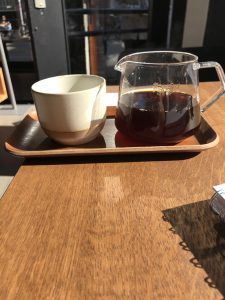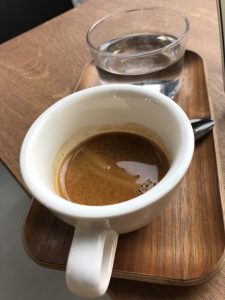For the past three years, I have been working with coffee. However, I have been involved with coffee for a much larger part of my life. In my youth, I always used to hang over the coffee pot in which the filter coffee would be poured by my parents. The aroma that fills your nose with the fragrant, yet funny smell of the ground coffee topped with water creates a drink that a large part of the world loves. Finland, in 2017, drank the most coffee. Which was an estimate of 10.35 kilos of coffee in a year (Statista 2016).
Although I am aware of the fact that the world consumes a lot of coffee, I was never actively busy with where my coffee comes from. Since I’ve started to work as a barista, for which I have had to follow several so called ‘coffee training’[1], which made me become more aware of where the coffee that I drink comes from. This put me to thinking. Are people around me aware of where their coffee comes from? Do they actively think about the supply chain of coffee?
Through this process, I ended up at Single Estate Coffee Roasters in The Hague. Although my employer, Roseval, utilizes Single Estate beans for their coffee, it struck me that nobody ever asked me where the beans came from. Whilst sitting here, in the Single Estate coffee bar, the first thing which the barista’s asked me was whether I would like to have an Ethiopian coffee or a Guatemalan coffee. The explanation that they gave me led me to choose the Ethiopian coffee. The taste of my double espresso was fruity and light, just as the way she described it to me. The second coffee I had, already jittering from the caffeine, was a filter coffee from which the beans were from Kenya.
People around me are chatting, busy with their own Sunday mornings. Almost everybody drinks coffee, or some form of coffee at least.[2] The most frequently ordered drink here, from what I can hear from it, is a cappuccino. The standard form of sitting here is people clenched with their hands around their cup, as if they would never want to let go of it. It seemed that the course of their day would depend on that last sip that is still in that cup. If rushed, their days would seem to go in a bad direction. If relaxed, their day would go in a smooth and easy going way. Although all of them are offered a choice at the beginning of their coffee experience, I rarely see someone asking beyond what they are offered.
This made me think. Why is it that the drink, which is consumed at a large-scale basis, not only in the Netherlands, but around the world, is never questioned? A 2018 research showed that 67 percent of the Dutch people drink coffee on a daily basis (van Gelder 2020). It is unknown what percentage of this coffee, which these Dutch consumers drink on a daily basis, comes from Africa.
In the Single Estate coffee bar, the ethnicity was mostly Caucasian. People in this bar took their time to consume the coffee which they were drinking. I assumed that most of the people that came to this bar were able to spend a little bit more, time and money, on drinking their coffee. It would take me a bit more time, and different research methods, in order for me to find out whether people were actually concerned with where their coffee comes from. Questions such as whether people are willing to spend a little more on ethical coffee arose. Is there a standard price/quality assumption which people have about the drink? These questions would take me a little more time to answer. Hopefully through this process of visiting different roasters I will be able to answer some more questions about the coffee which I consume on a daily basis.


[1] A coffee training is where a barista teaches you how to make the different sorts of coffee and where the beans of their company come from. This way you are taught to actively work with coffee and engage with the roasting process.
[2] With some sort of coffee, I refer to coffees with a form of foamed milk added to it.![]()
![]()
![]()
![]()
![]()
![]()
Bibliography
Statista Research Department. 2019. “Average daily coffee drinking consumption worldwide 2017, by country”. Last modified December 20th, 2019.
https://www.statista.com/statistics/695772/average-daily-coffee-consumption-by-country/
Gelder, van Koen. 2020. “Frequency of drinking coffee in the Netherlands 2018.” Last modified May 12, 2020.
https://www.statista.com/statistics/939410/frequency-of-drinking-coffee-in-the-netherlands/
![]()



Mirjam de Bruijn
September 24, 2020 (07:16)
Nicely done blog; that introduces us to a research theme; the observations are partly observations of the own mind, which is also ethnography and informs the observations. I look forward to more detailed descriptions though of the coffee-making and the transformation of coffee into something that is consumed.